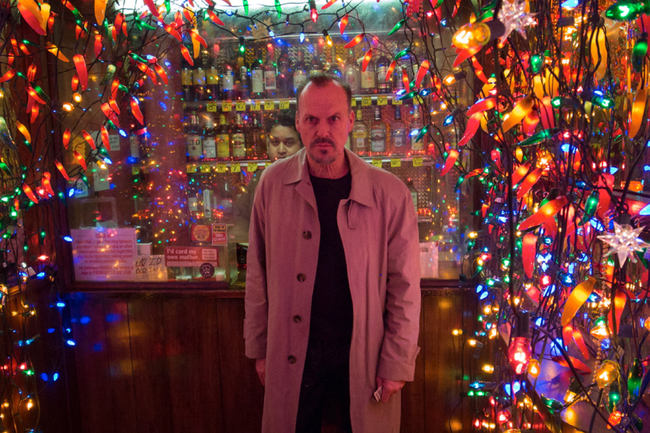Review: Birdman
Directed by Alejandro González Iñárritu • 2014 • 119 min
At first glance, Birdman seems to offer a self-aware, stylish example of art imitating life, with Michael Keaton as a fictional version of himself, trying to shed the spectre of a Batman stand-in from his earlier career. In reality, this is one small piece of a brilliantly nuanced exploration of celebrity, Hollywood, media, and art.
Looking to distance himself from his internationally popular (and lucrative) Birdman persona, Hollywood actor Riggan Thomson (Keaton), writes, directs, and stars in a Broadway adaptation of Raymond Carver’s What We Talk About When We Talk About Love. The play, Riggan hopes, will give his career meaning, validating his fame through a more meaningful engagement with his craft - one not measured in box-office revenue. Managing a strained relationship with his daughter (Emma Stone) while butting heads with Mike Shiner (Edward Norton), a gifted but difficult actor brought on board the night before previews, Riggan faces his past, ambitions, and insecurities in front of his friends, family, and a packed theatre.
One of the first things to stand out in Birdman is the pacing and impressive length of shots. The actors work expertly off of each other for several minutes at a time, giving the project a distinctly theatrical air. Long before we see a theatre stage on screen, we experience the immediacy and immersion that an unbroken shot can offer, mimicking, to some extent, a live performance. Using the technological advantages of the cinema, Iñárritu allows Keaton to deliver a series of soliloquies in which Riggan argues with his masked alter-ego while alone in his dressing room. This theatricality, rather than simply acting as a surrogate for the film’s subject matter, undermines Riggan’s notion that the medium is either unique in its ability to deliver raw, honest performances, or that it somehow deserves a higher standing in the art world.
This layered self-reflexivity is indeed Birdman’s most impressive feat. It becomes deceptively easy to believe Riggan and Shiner’s self-indulgent rants about their ability to deliver authenticity on stage, even as the actors give some of their finest performances on screen. Similarly, Iñárritu doesn’t waste a single opportunity to remind us of the construction and artificiality behind Riggan’s play, whether it be a faulty squib, a fake gun that doesn’t look quite real enough, or a deeply unsettling exchange between Shiner and his co-star Lesley (Naomie Watts, also in top form) in which he aggressively tries to sleep with her on stage to add to the play’s appeal to reality. Shiner’s ability to get an erection only when on stage is yet another contradiction in the actor’s dubious claims of authenticity. Even the long-take that seemingly encapsulates the entire film conspicuously reveals itself to be false with sleights of hand that allow the camera to make impossible leaps through space and time.
The main argument that shines through in Birdman is that artificiality is perfectly fine, and that it, perhaps counter-intuitively, doesn’t interfere with authenticity at all, artistic or otherwise. The characters in Birdman (as well as the actors and the characters that their characters are playing) have all constructed facades for themselves. They all take part in a series of staged negotiations in which they construct a version of themselves to present to the world, and they all struggle to consistently maintain these images. If Riggan can show a certain level of depth to the world, it will enrich the meanings attached to his existing celebrity status. His struggle for such control is frequently manifested as a telekinetic gift. Riggan hurls objects across rooms, levitates, or sets off explosions using only his mind. He seeks to direct his own life with the agency and sovereignty of a filmmaker.
Not surprisingly, this power exists only in Riggan’s mind. It is one more artificial feature of a nevertheless rich, complex, and, yes, authentic character.
Following up 2010’s intimately moving Biutiful, Birdman is further proof of Iñárritu’s skill with smaller scale stories. After a series of impressive and ambitious films featuring complex, interlocking storylines, culminating in perhaps his weakest film Babel, the director’s work on more focused character studies, and now sophisticated self-reflexivity, are signs of a dynamically gifted artist hitting his stride after an already incredibly successful career.
